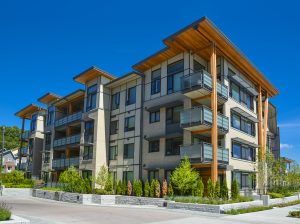November 20, 2018
For some reason, students in our real estate school struggle with the subject of townhouses, condominiums, and co-operatives. Let’s take them one by one.
What are townhouses?
 A townhouse (or townhome) is an architectural style of residential property. It is the suburban equivalent of the rowhomes we see in our large cities. Townhouses are invariably connected to one another, perhaps in as few as two units, or in as many as 20 or more.
A townhouse (or townhome) is an architectural style of residential property. It is the suburban equivalent of the rowhomes we see in our large cities. Townhouses are invariably connected to one another, perhaps in as few as two units, or in as many as 20 or more.
Most townhouses are bought in “fee simple,” which means the buyer has the same rights of ownership in perpetuity as would a person who owned a single-family home. When you own such a townhouse, you are responsible for the cost of maintaining your entire property.
How about condominiums?
Just this week, a student in our Cherry Hill real estate licensing school argued her understanding that the word “condominium” also depicted the style of residence. While several other students nodded in agreement, she asked, “Isn’t a condo typically a small home on a single floor, like an apartment?”
Maybe.
While most condominiums—the word is usually shortened to “condo”—do tend to have the physical appearance of an apartment, they can also look like townhouses or even like detached single-family homes. The difference is that while the condo owner owns his or her individual unit, it is part of a complex consisting of common areas (such as parking lots, pools, gardens, and exercise facilities) that are owned and managed by the condominium association. The expenses of maintaining those common elements is then billed to each condo owner, pro-rated on the percentage of the total housing complex that their unit encompasses.
Because the common areas even include hallways, HVAC systems, elevators, the roof, etcetera, it is important to understand that the individual condo buyer only owns from the middle of the walls, and from the middle of the ceiling and floor—inwards. So, if the condo needs a new roof, the cost of such a large project would be borne by the condo association and then shared by each condo owner who benefited from it. Same thing for the snow plowing, landscaping, and repairs to parking lots and pools. Buying a condo is often the most affordable option for first-time home buyers, although mortgage companies charge a slightly higher interest rate for condo purchases.
And then there are co-operatives.
 Co-ops are a completely different animal. While you may look at a physical building and not be able to tell whether it was rental apartments, condos, or co-ops, the type of ownership is completely different. In a co-op, the corporation owns the entire building. Persons wishing to live in such a building must apply to the co-op board, a process that can be tedious and intrusive. They ask personal questions about the applicant’s employment, lifestyle, and income, and have been asked to have an applicant show proof that that have very large balances of liquid assets. One Manhattan co-op board famously refused to approve Richard Nixon’s application to live there after he left the presidency.
Co-ops are a completely different animal. While you may look at a physical building and not be able to tell whether it was rental apartments, condos, or co-ops, the type of ownership is completely different. In a co-op, the corporation owns the entire building. Persons wishing to live in such a building must apply to the co-op board, a process that can be tedious and intrusive. They ask personal questions about the applicant’s employment, lifestyle, and income, and have been asked to have an applicant show proof that that have very large balances of liquid assets. One Manhattan co-op board famously refused to approve Richard Nixon’s application to live there after he left the presidency.
Once approved, you do not own any real estate! It may cost you a million dollars to move in, but you then simply own stock in the co-operative corporation and a proprietary lease that gives you the right to live there.
This comes with certain risks. What if 25% of the building is comprised of people who work on Wall Street and there is a market crash that creates massive layoffs? Those high-flyers can now no longer make their monthly maintenance payments, and that could cause the co-operative to default on its mortgage. The lender could then foreclose—leaving you, who never missed a payment—homeless, and holding nothing but a worthless stock certificate in the corporation.
David C. Forward is a licensed real estate broker and instructor and was first licensed as a Realtor® 30 years ago. He is School Director of Garden Real Estate Academy, has won numerous awards for real estate sales, is a much-requested public speaker who has addressed audiences on six continents and is the author of 13 books. David can be reached at Support@GSREacademy.com





